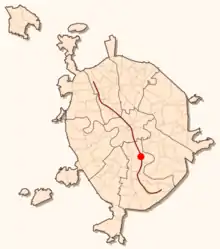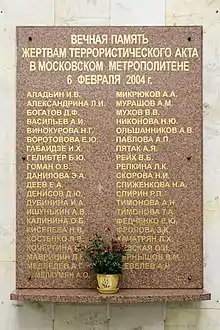February 2004 Moscow Metro bombing
The February 2004 Moscow metro bombing occurred on 6 February 2004 when a male suicide bomber killed 41 people near Avtozavodskaya subway station on the Zamoskvoretskaya Line in Moscow. Up to 120 people were injured in the incident, some of the more common injuries being broken bones and smoke inhalation.
| February 2004 Moscow bombing | |
|---|---|
| Part of Terrorism in Russia and Islamic terrorism in Europe | |
 The location of the metro blast on the map of Moscow | |
| Location | Moscow, Russia |
| Date | Friday, 6 February 2004 08:40 MSK (UTC+03:00) |
| Target | Moscow Metro train |
Attack type | Suicide attack |
| Deaths | 41 |
| Injured | 102 to 120 |
| Perpetrators | Nikolai Kipkeyev Anzor Izhayev (bomber) |

The attack
The blast occurred at about 08:40 MSK on 6 February 2004 at Avtozavodskaya station, on the metro system's Zamoskvoretskaya Line.
President of Russia Vladimir Putin blamed Chechen separatists for the Moscow metro attacks. Chechen rebel leaders denied involvement.
A previously unknown Chechen terrorist group claimed responsibility for the bombing; the claim came from a group calling itself Gazoton Murdash, and signed by Lom-Ali ("Ali the Lion").[1] According to the statement, the group launched the attack to mark the fourth anniversary of the killing of scores of Chechen civilians by Russian soldiers in Grozny in the Novye Aldi massacre.
Shamil Basayev said that for his organization, the cost was $7,000 U.S. dollars.[2]
Perpetrators
On 2 February 2007, Tambiy Khudiyev and Maksim Panaryin from Karachay-Cherkess Republic and Murad (Murat) Shavayev from Moscow were found guilty of terrorism and murder in connection with the explosion and have been given life sentences by the court.[3] According to the sentence, Khudiyev and Panaryin were trained in camps in Chechnya and organized the suicide bombing under the orders of the ethnic Ukrainian Islamic militant Nikolai Kipkeyev. Shavayev, who worked as a Justice Ministry bailiff in Moscow, brought the explosives for them.
Panaryin was also found guilty of planting bombs on several bus stops in Krasnodar in August 2003 (four people died and 17 were injured in these attacks). After the metro bombing, he continued planting explosives, blowing up several bus stops in July 2004 in Voronezh (one person died and nine were injured).
Kipkeyev was not satisfied with low casualties and started preparing a new metro explosion. He escorted an unidentified female suicide bomber to the Rizhskaya metro station in Moscow on 31 August 2004, however the bomber panicked and detonated the explosives before entering the station, killing Kipkeyev and 10 other people. Khudiyev and Panaryin were arrested in 2005 and pleaded guilty to the charges they faced.[4]
See also
References
- Chechen group "Gazoton Murdash" claims responsibility for blast in Moscow metro Archived 2007-05-20 at Archive.today
- Dougherty, Jill. "Chechen 'claims Beslan attack'." CNN. Friday 17 September 2004. Retrieved on 31 October 2011.
- Now they won't let them out for sure, Kommersant, February 3, 2007.
- Terrorists switched from buses to metro, Kommersant, November 8, 2006.